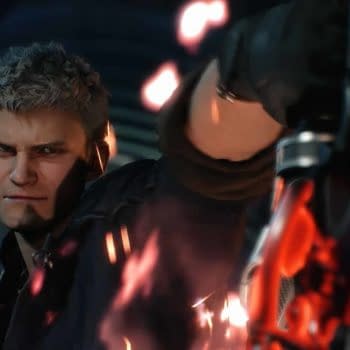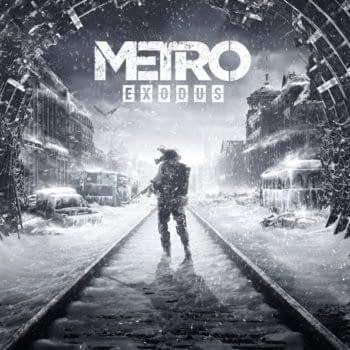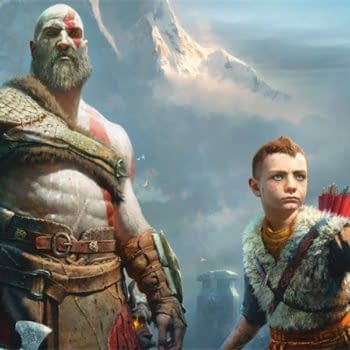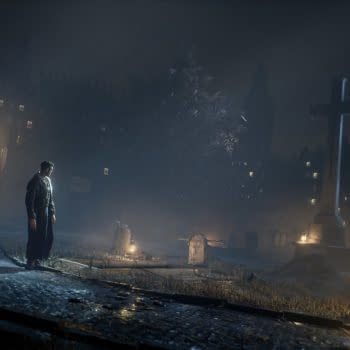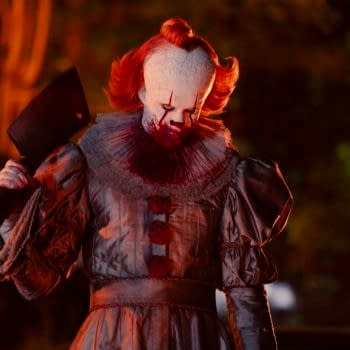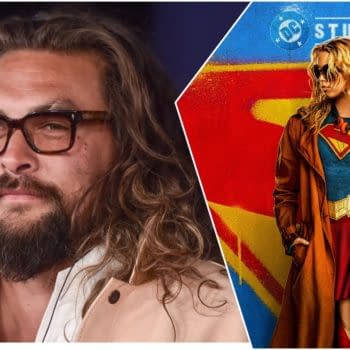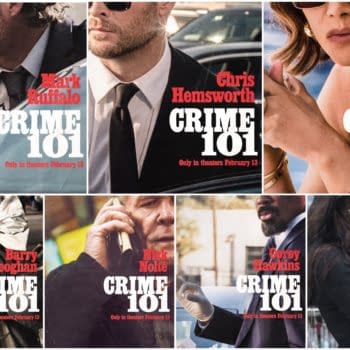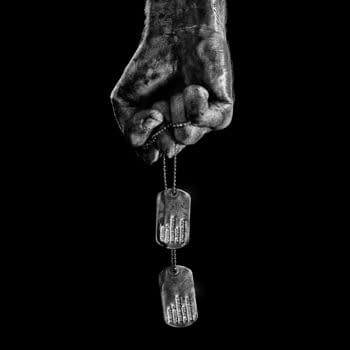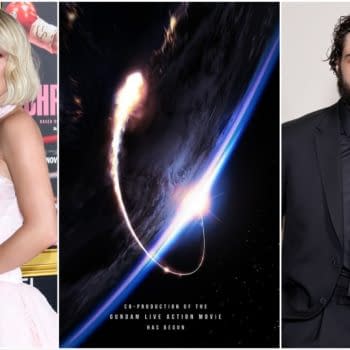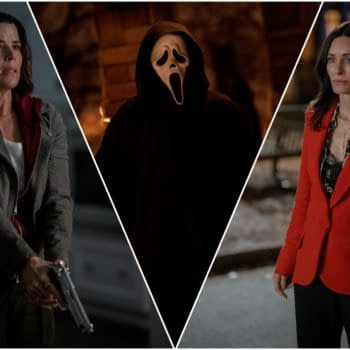Posted in: Movies | Tagged: adi tantimedh, entertainment, look it moves, radio, Tumanbay
Tumanbay: Exit Interview With The Director – Look! It Moves! By Adi Tantimedh
Tumanbay has its finale this week, ending on a cliffhanger in ways similar to how season one of Game of Thrones did. This is probably BBC Radio's most ambitious historical radio drama series for years, and it's apparent there will be a season two at some point down the line. Spies, assassins, plague, an invading army, war, slavery, revenge, an empire under siege, all the ingredients for an epic drama. Goldhawk Productions have been producing some of the most interesting and innovative radio dramas for the BBC for years, from multipart adaptations of Vikram Seth's A Suitable Boy and Q & A (which later became the Oscar-winning movie Slumdog Millionaire) and the police drama Undercover Mumbai, all of which were recorded on location in India to Tumanbay, creating movies of the mind by having the actors go through the actions in costume rather than just standing in front of microphones in studios to create a sense of authenticity.
We have an interview with co-writer, producer and director John Dryden once the whole series was out. We talk about the dynamics of radio production and the impact of radio drama in an age of binge-watching and binge-listening, social media, global digital streaming and app.
AT: You're a filmmaker as well as a radio drama producer, and your radio drama productions often go the extra mile in recording on location and having the actors go through the actions rather than just stand in front of a microphone in a script to lend a stronger sense of grit and authenticity. I'm particularly struck by this in UNDERCOVER MUMBAI, which gives the listener a strong sense of what it's like to actually be on the streets of Mumbai. What made you decide to produce radio drama as if it was a film or TV shoot on location?
John Dryden: The first programmes I had complete creative control of were radio documentaries. I'd been working in TV and film, but these radio documentaries for the BBC gave me the freedom me to go off and record everything myself, then come back and edit them myself. They were real-life stories – for instance, one was about a group of people taking aid to Romanian orphanages, a trip that goes disastrously wrong – in which I would literally follow people around with my microphone and record everything they said and then edit the hours and hours of material into a fast-paced real-life 45-minute drama. So many choices had to be made in the edit that determined the pace, tone, style of the documentary, choices about what to put in, what to leave out – that I started to realize that a documentary, whilst purporting to be real life, is in fact a construction. I started to think drama might be a more honest medium for me. Moreover, I could use the same production techniques I'd been using in my documentaries – i.e. the microphone following the action in real locations – to give the drama a more credible, more urgent tone than if it were recorded in a dead studio space. So my style developed out of that. There is so much visceral musicality in the real world – I want to use it. When making a drama set in modern-day India, why wouldn't you want to make it there, rather than in a cold, dead studio somewhere else.
Your productions "Q & A", THE SEVENTH TEST, SIX SUSPECTS, UNDERCOVER MUMBAI and A SUITABLE BOY have done more to portray contemporary India in drama more than any film or television outside of Bollywood. Did you set out to do that or did it just happen that the BBC were happy to produce them as socially relevant drama?
I set out to do it. The way it works: I pitch projects to the BBC, they decide if they want them or not. If they do commission a project, they leave you to get on with making it, by and large. Part of my pitch with these projects was to go to India and make them there with an all-Indian cast. I don't see them as "socially relevant" drama by the way – they are mostly fast-paced thrillers set in a world that is very convincing and authentic. One of the things I like about developing stories set India, is that you can believe almost anything is possible there – it's such a vast, unregulated, unknowable place with very rich people and very poor people and all extremes of everything – it lends itself to epic story-telling. In a country like the UK it can be hard to find that epic sweep – everything is too known. India is like the US in that respect. I find it very exciting working in India – I have an amazing group of actors and production people I work there with.
TUMANBAY is your most ambitious production to date, up there with the scope and ambition of GAME OF THRONES in its examination of Class, Political Power, the perils of rule and the decadence and stagnation that leads to the fall of an empire. And it's original, not an adaptation of a book. How did you come to write it, with its sprawling cast of characters and interlocking plotlines?
Though I had mostly been making stories set in the modern world, I had always liked the idea of an epic historical drama. But I didn't want to get too tied down with telling a real history – I didn't want the facts to get in the way of a good story. I have spent quite a bit of time in Egypt over the years – in fact I was born and brought up in the middle east – and I had read about the Mamluks, these slaves brought to Cairo from the Russian Steppes, who managed to assimilate themselves, adopte the religion and customs of the Islamic world and then built the one of the most successful empires the world has ever seen. They also made Cairo the richest most happening city in the world, a city that drew people from everywhere in search of power and fortune. What really interests me about Mamluk society is that everyone came there as slaves and everyone could make their way to the top by shear ability and determination. Many of the events in the drama did happen in reality – there was a slave trader who lost his family at sea, there was a rebellion in a far-off province, the severed head of a favorite ally was thrust in front of the Sultan – but it has all been condensed from a three-hundred-year history. A lot has been made up too. The aim was not to create an historical drama but a world in which we could explore the world today. There are a lot of themes and issues that should resonate with the audience – I hope they do – about relationships, about foreign policy, about freedom. Above all, we wanted to tell a really fast-paced story with lots of shocks, lots of twists and turns. There's a lot of pain, but it's sort of enjoyable pain if you know what I mean. What's great about telling a story like this through radio is that it allows the audience to picture it all in their heads – unlike in a film or TV series where what you see on the screen is all there is. Everything about this series is designed to help the audience's imagination work overtime.
While a historical drama, it also starts to lean comfortably into the realm of fantasy with the introduction of mysticism and prophecy into the story. Do you see this as a mainstay of historical genre storytelling?
TUMANBAY isn't history in the sense that say, WOLF HALL is. TUMANBAY is largely a made-up world that borrows loosely from the Mamluk era. But we wanted the world to feel real and didn't want to have supernatural elements. There are no dragons for instance. There is a child in the drama, called Frog, who is know for having prophetic dreams, but what is interesting about him is the importance others in the story place on his dreams. There is a lot of violence and death in this world. The plague regularly wiped out vast swathes of the population. People were superstitious and clung to the idea of the supernatural world. So I would say TUMANBAY reflects the characters' belief in the supernatural and mysticism rather than there actually being magic in the story.
Now that Tumanbay is complete, what are your thoughts on the whole experience?
It is an amazing thing to create a world in your head and for it to start to become "real" through the involvement of the actors and the creative team. I'm really thrilled that the series has such a dedicated following.
Before the internet, BBC radio dramas could only be heard once and were rarely repeated but for some exceptions. Now in the age of podcasting, I can download and listen to Radio 4 comedies and dramas at my leisure even from overseas.
You'd mentioned that TUMANBAY, which even has its own app on the iTunes Store, has been able to get a higher profile than before. We're in a period where audio drama is seeing a niche, cultish resurgence in America with series like the Halo 5 video game tie-in HUNT THE TRUTH and WELCOME TO NIGHTVALE, and various smaller, lesser-known ventures. When you think about it, every country in the world aside from America have had thriving radio drama industries. Do you think audio or radio drama has the potential to become a bigger global cultural phenomenon? What are your thoughts on radio drama now in the age of the internet and social media where the potential worldwide audience is much larger than just the domestic listeners in the UK?
The way audiences listen to audio drama (and the way they watch TV drama too) is changing. We pushed hard to have TUMANBAY released as a podcast because we wanted the audience to have the ability to listen to it at a time of their own choosing and to go back and re-listen to episodes. It meant that we could make the series much more layered and complex than if it were only to be broadcast once. We wanted the audience to WANT to go back and re-listen to episodes. Often radio dramas are less complex than this with less characters. TUMANBAY in some sense harkens back to a timewhen the BBC would dare to put on a 26-part radio adaptation of LORD OF THE RINGS in the early 1980s, which was similarly complex and layered. I guess people had more time on their hands then, or had longer concentration spans, or were less distracted by all the things that we are distracted by today. But there is a renewed appetite for this big sweep, expansive, episodic, story-telling with podcasting – people can listen on the way to work and they can binge on it too when snowed in, even get a little obsessed if they like. I think SERIAL was a game-changer too. And WELCOME TO NIGHTVALE. They have shown that there is a real appetite for long-running serials that can audiences can grow close to. They have also made commissioning editors realize that audiences don't need to be spoon-fed quite as much as they thought.
So what's next? Is there a third season of UNDERCOVER MUMBAI coming?
Well, I'm working on a feature film with Steve Coogan's company Baby Cow called A KIDNAPPING. It's a thriller about two teachers at an international school in Manila who attempt to kidnap the son of a wealthy Filipino politician – a plan that goes horribly wrong. There is also series two of TUMANBAY and we are currently discussing with the BBC another series of UNDERCOVER MUMBAY which, if it happens, will probably be for September/October this year.
All episodes of Tumanbay can be downloaded from the BBC site.
http://www.bbc.co.uk/programmes/b06qcrhv/episodes/downloads
There is also a dedicated iPhone app for downloading the episodes on your iOS device.
https://itunes.apple.com/us/podcast/tumanbay/id1062307412?mt=2
It's a radio world at lookitmoves@gmail.com
Follow the official LOOK! IT MOVES! twitter feed at http://twitter.com/lookitmoves for thoughts and snark on media and pop culture, stuff for future columns and stuff I may never spend a whole column writing about.
Look! It Moves! © Adisakdi Tantimedh




